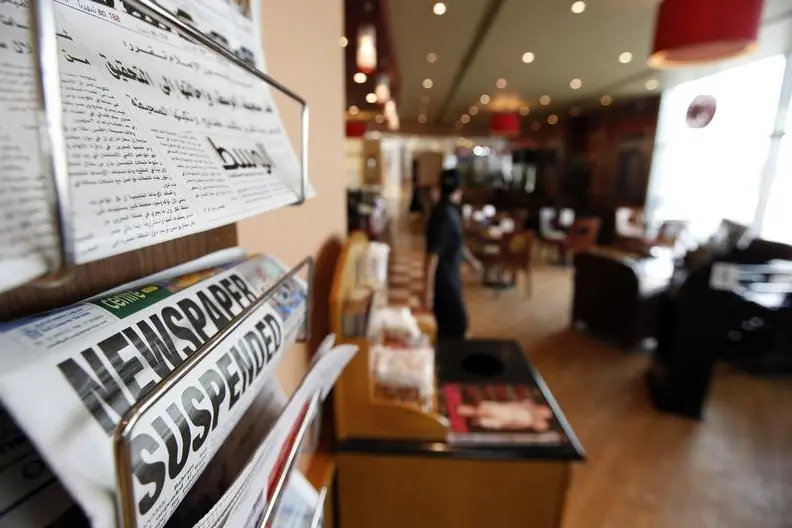PHOTO
*January 1: Saudi Arabia and the United Arab Emirates became the first two Gulf Arab states to introduce a five percent value-added tax (VAT) on a number of consumer products and services. The new tax that was the first of its kind in the Gulf Cooperation Council (GCC) and came as an attempt by the Arab world’s two biggest economies to generate new sources of income, reducing their reliance on oil revenues.
All six GCC countries have agreed to introduce VAT but only Saudi Arabia and the UAE have so far implemented the decision. Bahrain’s parliament has approved the final law for the VAT, paving the way for the introduction of the tax in the new year.
Explanations and clarifications on VAT use continued throughout the year, and in the UAE a scheme offering refunds for tourists was eventually introduced in November.
*February 2: The New York Times and the Wall Street Journal report concerns among several international investors, including the World Bank’s International Finance Corporation and the Bill and Melinda Gates Foundation over Abraaj’s handling of hundreds of millions of dollars they had invested in a $1 billion health care fund managed by Dubai-based Abraaj, which was then the Middle East’s biggest private equity firm.
The news sparked investigations that led to the downfall of Abraaj and the resignation of its founder and CEO Arif Naqvi.
*April 2: Egyptian President Abdel Fattah al-Sisi was re-elected President for a new four-year term. The former army general was first elected president in 2014 after he orchestrated the ousting of elected Islamist President Mohamed Mursi, following mass protests against Mursi’s one-year rule that saw a strong rise of his Islamist allies, while other political groups were sidelined.
Sisi won by around 97 percent of the votes in the two rounds of elections. Since becoming President, Sisi has managed to push through tough economic reforms and raised the state’s strategic foreign reserves and growth rates by significant amounts, however he has also cracked down hard on Islamists, other opponents and the media.
*April 18: Movie theatres open in Saudi Arabia for the first time in decades, as the kingdom moves forward with economic and social reforms.
*May 21: The UAE issues a new entry visa system that would allow international investors full ownership of onshore companies and grants long term visas to residents who work in certain professions, such as medicine and engineering, as well as to innovators and entrepreneurs. The move comes as the government looks to attract more people to work and stay in the country.
*June 20: Global index provider MSCI said it would reclassify Saudi Arabia as an emerging market starting mid 2019 - a decision that is expected to support the kingdom’s equity market and attract more investments to the market when implemented. The decision followed a similar announcement by competing index compiler FTSE Russell in March.
*June 27: Saudi Arabia lifts a decades-old ban on women driving, as part of the kingdom’s plans to liberalise the country.
*August 23: Reuters reports that Saudi Arabia has called off plans to list its domestic and international state oil giant Aramco, citing four senior industry sources. It says advisors working on the plan have been stood down. Crown Prince Mohammed Bin Salman subsequently tells Bloomberg on October 5 that the Aramco IPO plan will go ahead, promising an initial public offering by late 2020 or early 2021.
October 2: Saudi journalist Jamal Khashoggi is killed inside the kingdom’s Istanbul consulate, a case that prompts huge international attention and leads to several senior international business figures withdrawing from the kingdom’s showcase Future International Investment conference that was taking place in Riyadh in the same month.
October 4: The Kingdom of Bahrain receives a pledge of financial support worth $10 billion from three of its Gulf neighbours – Kuwait, Saudi Arabia and the United Arab Emirates – as it announced a plan to embark on a fiscal balancing plan.
Concerns over the kingdom’s financial health had led ratings agency Fitch to downgrade Bahrain’s sovereign rating in March, with Moody’s following suit in August. The cost of insuring Bahrain sovereign bonds also ballooned in May and June as credit default swaps soared to record levels.
A regional outlook published by the International Monetary Fund in May stated that the level of Bahrain’s spending meant that it needed an oil price of $113 per barrel in order to reach a budget breakeven level – higher than any of its GCC neighbours.
(Compiled by Yasmine Saleh, Edited by Michael Fahy)
Our Standards: The Thomson Reuters Trust Principles
Disclaimer: This article is provided for informational purposes only. The content does not provide tax, legal or investment advice or opinion regarding the suitability, value or profitability of any particular security, portfolio or investment strategy. Read our full disclaimer policy here
© ZAWYA 2018




















